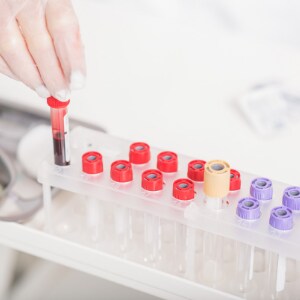What Are Annual Blood Tests And Why Should You Get Them?
 Most people probably have had blood drawn at some point in their lives. Blood tests analyze various components of your blood to detect physiological and chemical changes in the body. These blood tests can indicate things such as what diseases a person may have, how effective their medications are, and how their organs are functioning.
Most people probably have had blood drawn at some point in their lives. Blood tests analyze various components of your blood to detect physiological and chemical changes in the body. These blood tests can indicate things such as what diseases a person may have, how effective their medications are, and how their organs are functioning.
 By getting blood work each year, your doctor is able to track the way your body changes throughout your life. Even if you are healthy, getting blood work now can help give your doctor a baseline so should something change in the future, they can compare results and detect subtle changes.
By getting blood work each year, your doctor is able to track the way your body changes throughout your life. Even if you are healthy, getting blood work now can help give your doctor a baseline so should something change in the future, they can compare results and detect subtle changes.
But what tests should you be getting? There are many different types of blood tests that indicate different things. Talk to your doctor at your annual physical about which tests they would recommend for you.
What are Different Types of Blood Tests?
Fisher-Titus hosts several health screenings throughout the year where individuals can pay out of pocket for various blood tests at a reduced rate. For individuals who are uninsured or for those whose insurance may not cover these types of tests, this can be a more affordable option to get the testing they need.
The tests below are all offered at varying prices at all Fisher-Titus Community Health Screenings.
Complete Blood Count – The complete blood count acts as a quick snapshot of your overall health. It measures the number, variety, percentage, concentration, and quality of platelets, red blood cells, and white blood cells. It is useful in screening for infections, anemias, and other hematological abnormalities.
Basic Metabolic Panel – The basic metabolic panel measures glucose, blood urea nitrogen (BUN), creatinine, electrolytes, and calcium. This test can help determine whether your kidneys are functioning properly and helping you maintain the right balance of water, salts, and minerals in your blood.
Lipid Profile – The lipid profile provides your doctor with information on your cardiovascular health. This test measures cholesterol, triglycerides, HDL, and LDL.
Liver Enzymes – The liver enzymes tests can indicate if there is liver disease or damage. This test can also be used to monitor liver disease in a person who has a diagnosed problem. The test measures alanine transaminase (ALT) and aspartate transaminase (AST). ALT helps convert proteins into energy and AST helps metabolize amino acids. When the liver is damaged, these enzymes are released into the blood and elevated levels will show on the test.
Complete Blood Count, Basic Metabolic Panel, Lipid Profile, and Liver Enzymes are all part of the Blood Analysis test offered at Fisher-Titus Community Health Screenings.
PSA (Prostate Specific Antigen) – PSA is a protein found in men that is created in the prostate. A PSA test checks the level of this protein. Elevated levels can indicate if a person has an enlarged prostate, prostate inflammation, or prostate cancer.
Hemoglobin A1c – A Hemoglobin A1C test is one of the best ways to assess glucose status. The test measures your blood sugar over the past few months. The results can help your doctor diagnose prediabetes and diabetes and is also used to help manage diabetes in patients who have been previously diagnosed.
TSH (Thyroid) – Thyroid Stimulating Hormone (TSH) controls thyroid hormone secretion. If levels from this test are lower than normal, it can suggest hyperthyroidism. If levels are above normal, it can suggest hypothyroidism. Symptoms of thyroid imbalance can be hard to pinpoint and some individuals may not even have any symptoms. A TSH blood test can help your doctor diagnose mild thyroid imbalance before it progresses and becomes a larger problem.
Vitamin D – Having inadequate levels of vitamin D in the blood is a very common issue. Vitamin D deficiency can be linked to osteoporosis, increased fracture risk, cancer, autoimmune dysfunction, cardiovascular disease, multiple sclerosis, lowered immunity to colds and flu, type 1 diabetes and hypertension. By regularly checking your Vitamin D levels, your doctor can determine if you have a Vitamin D deficiency and can help you determine the appropriate steps to correct it.
About Rodney
Rodney Tuttle is the Director of Laboratory at Fisher-Titus. The next Fisher-Titus Community Health Screening is on October 24 from 7-10 a.m. Schedule an appointment by calling 419-660-2646. You will be asked to choose from a list of tests and provide the name of your physician. Registration closes on October 21 at 5 p.m. For more information, visit our online event calendar at fishertitus.org/upcoming-events.
